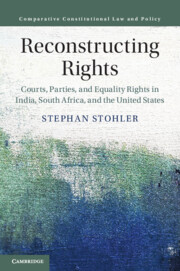 Reconstructing Rights
Reconstructing Rights from Part III - India
Published online by Cambridge University Press: 09 July 2019
The increasing salience of Hindu nationalism and the emergence of the Bharatiya Janata Party (BJP) as a serious competitor in Indian politics during the 1990s forced Congress into a difficult position. Congress increasingly defended Other Backward Classes reservations to retain its appeal across India's "Hindi Belt," even hoping to ensure that members of the lower castes gained access to educational opportunities. But, by exercising increased authority over private school enrollment, Congress's policies potentially jeopardized the independent character of private minority schools that educated Christian and Muslim students, opening the door for further government control if the BJP won elections. Congress officials worked with aligned justices to develop a constitutional framework that protected education reservations while preserving the independent character of minority schools. Unlike the other examples in this book, however, these deliberations repeatedly produced inadequate results. Finally, Congress amended the Constitution and the Supreme Court willingly capitulated in a subsequent basic structure challenge, which is consistent with the deliberative partnership thesis.
To save this book to your Kindle, first ensure no-reply@cambridge.org is added to your Approved Personal Document E-mail List under your Personal Document Settings on the Manage Your Content and Devices page of your Amazon account. Then enter the ‘name’ part of your Kindle email address below. Find out more about saving to your Kindle.
Note you can select to save to either the @free.kindle.com or @kindle.com variations. ‘@free.kindle.com’ emails are free but can only be saved to your device when it is connected to wi-fi. ‘@kindle.com’ emails can be delivered even when you are not connected to wi-fi, but note that service fees apply.
Find out more about the Kindle Personal Document Service.
To save content items to your account, please confirm that you agree to abide by our usage policies. If this is the first time you use this feature, you will be asked to authorise Cambridge Core to connect with your account. Find out more about saving content to Dropbox.
To save content items to your account, please confirm that you agree to abide by our usage policies. If this is the first time you use this feature, you will be asked to authorise Cambridge Core to connect with your account. Find out more about saving content to Google Drive.